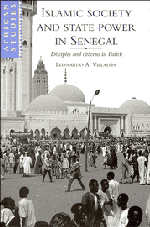Book contents
- Frontmatter
- Contents
- List of tables
- Acknowledgments
- A note on spelling
- Glossary
- Map of Senegal
- Introduction: good Africans, good citizens, good Muslims
- 1 Islam in the politics of state–society relations
- 2 The structure of society: Fatick in the Senegalese context
- 3 The state–citizen relationship: struggle over bridges
- 4 The marabout–disciple relationship I: foundations of recruiting and following
- 5 The marabout–disciple relationship II: the structures of allegiance
- 6 The state–marabout relationship: collaboration, conflict, and alternatives
- 7 Bureaucrats, marabouts, and citizen–disciples: how precarious a balance?
- Notes
- Select bibliography
- Index
- Titles in the series
7 - Bureaucrats, marabouts, and citizen–disciples: how precarious a balance?
Published online by Cambridge University Press: 10 November 2009
- Frontmatter
- Contents
- List of tables
- Acknowledgments
- A note on spelling
- Glossary
- Map of Senegal
- Introduction: good Africans, good citizens, good Muslims
- 1 Islam in the politics of state–society relations
- 2 The structure of society: Fatick in the Senegalese context
- 3 The state–citizen relationship: struggle over bridges
- 4 The marabout–disciple relationship I: foundations of recruiting and following
- 5 The marabout–disciple relationship II: the structures of allegiance
- 6 The state–marabout relationship: collaboration, conflict, and alternatives
- 7 Bureaucrats, marabouts, and citizen–disciples: how precarious a balance?
- Notes
- Select bibliography
- Index
- Titles in the series
Summary
The relations between any two of the three sets of actors we have considered in this work – the state, the marabouts, and the citizen-disciples of Senegal – can only be understood in the context of relations with the third. Moustapha Sy's DMWM illustrates this well: the state has been obliged to deal with the marabout given his clientele; the marabout has sought to define a relationship with the state adapted to the ties he has attempted to build with his followers; and citizen-disciples have moderated their response in accordance with their view of the relationship between the marabout and the state. In addition, the movement's evolution demonstrates the extent to which such a three-sided pattern of socio-political interactions remains absolutely central to Senegalese social life. The maraboutic model has provided the “normal,” default manner of organizing Senegalese society outside of the state. Because the state must then deal with society organized in this manner, the maraboutic system is the essential institutional structure defining the processes of state-society relations.
The extent to which the system has been routinized is clearly indicated by a maraboutic movement of some importance in Fatick, that led by the Serer marabout Ma Ansou Niang from a village near the Gambian border.
- Type
- Chapter
- Information
- Islamic Society and State Power in SenegalDisciples and Citizens in Fatick, pp. 244 - 265Publisher: Cambridge University PressPrint publication year: 1995



